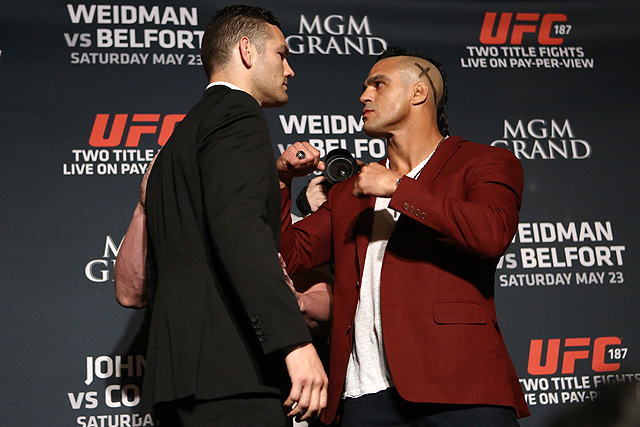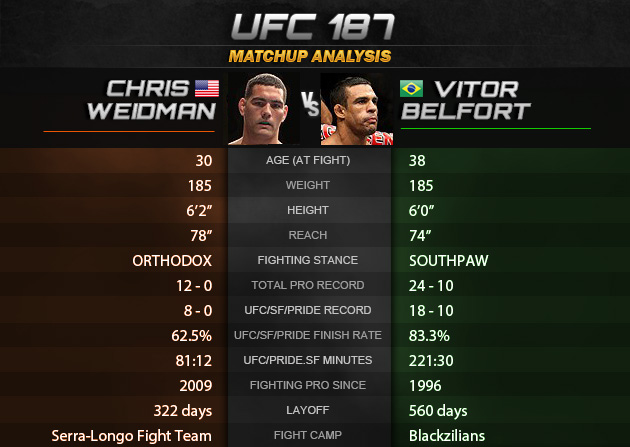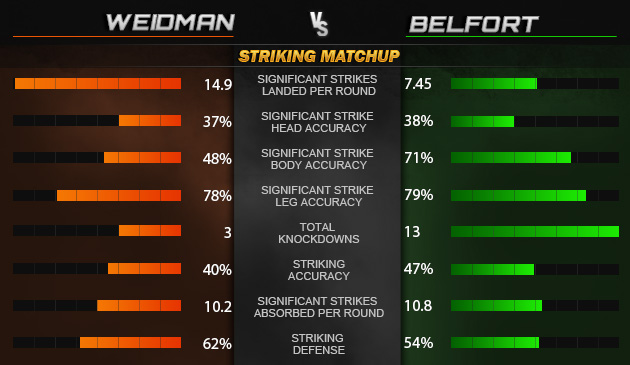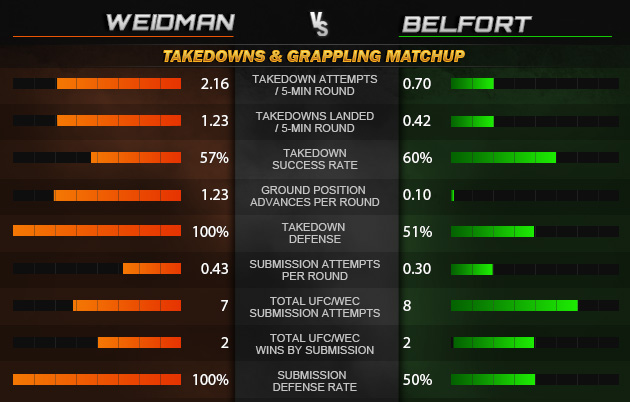UFC 187 Statistical Matchup Analysis: Weidman vs. Belfort

Chris Weidman will tackle Vitor Belfort in the UFC 187 co-main
event. | Photo: Dave Mandel/Sherdog.com
The masses will echo this sentiment: It is about damn time.
The Ultimate Fighting Championship middleweight strap has been skirting its obligations for six months now, with champion Chris Weidman sidelined from hand and rib injuries that prevented him from competing at UFC 181 and 184, respectively. The undefeated champion now looks to add a third defense to his title reign since he upset perennial division kingpin Anderson Silva in 2013. Throughout his eight UFC fights, Weidman has looked comprehensively dominant, seldom dropping a round and largely avoiding any potentially hairy exchanges. So far, it is safe to say he has taken more serious damage in training camps than in the Octagon.
Advertisement
Related » UFC 187 Fight-by-Fight Preview
Now that fight week is upon us, cross your fingers, knock on wood, cut a chicken’s head off or throw salt behind your left shoulder and spin around -- do whatever it is people do to ensure that we will see this fight finally come to fruition. Assuming it does, let us see what the Tale of the Tape tells us for the UFC 187 co-main event between Weidman and Belfort on Saturday at the MGM Grand Garden Arena in Las Vegas:

First, the anthropometric differences: As the younger, larger fighter with a longer reach, Weidman has a distinct athletic advantage. That is no knock on Belfort, who is a fine physical specimen himself, but Weidman is simply on another tier of athleticism, especially given the question marks surrounding Belfort’s age, layoff and ability to perform post-TRT. Belfort has been a freakish athlete for so long, one has to assume that his time as an elite fighter is coming to a close sooner than later. The ultimate equalizer Belfort has always had in his pocket -- blitzing hand speed -- may or may not be present come fight night; only time will tell. There is a thin, left-leaning silver lining for Belfort in his southpaw stance, which may give him some opportune moments on the feet. That being said, four of Weidman’s seven UFC opponents have been southpaws, so it is by no means a new challenge for him.
In the time-related arena, it is not so straight forward. Eight
years the elder, Belfort made his professional debut when Weidman
was 12 years old. That extra 13 years of professional experience
will be invaluable for the crafty veteran, who not so long ago had
former light heavyweight champion Jon Jones in
hot water with a slick armbar attempt -- a bright indication that
he still has some tricks up his sleeve. On the other hand, that is
an additional decade of professional-grade wear and tear on “The
Phenom’s” body, and while the long layoff may aid Belfort’s ability
to perform at optimum levels on fight night, it also has a flipside
of potential ring rust.
If the Tale of the Tape told the whole story, there would be no need to slap on gloves and step into the cage. Let us see what a more detailed breakdown of the striking numbers tells us:

Belfort has some of the most perplexing striking numbers in the game. He is unusually inaccurate for throwing such low volume, and yet he is also unusually effective at finding his opponents’ chins; Belfort has more knockdowns than Weidman has career fights. “The Phenom’s” striking is large; it contains multitudes.
Despite those differences, both men have similar striking tendencies. Belfort headhunts in 88 percent of his strikes, with seven percent of his attempts aimed at the body and the remaining five percent being leg strikes. Not surprisingly, 68 percent of Belfort’s strikes come from distance, followed by 23 percent to grounded opponents and nine percent in the clinch. Similarly, Weidman favors going up top, with head shots taking up 86 percent of his strikes and body and leg strikes making up the remaining eight percent and six percent, respectively. His preferred range also mirrors Belfort’s: 72 percent of his strikes come at distance, 20 percent are ground strikes and eight percent come in the clinch.
With slightly better accuracy and defense and undeniable knockout efficiency, Belfort’s best chance to win this fight will be upright at distance. The crux is that, at least when it comes to striking, distance striking is also Weidman’s wheelhouse -- and the “All-American” has the volume, physicality and reach in his corner. Not to mention, Weidman is a significantly more able grappler, and the threat of the clinch and takedown could alter Belfort’s usual patient aggression. Then again, “The Phenom” also has the striking ace in the hole of a far more diverse kickboxing arsenal at his disposal, whereas Weidman is more of a traditional boxer. With knockout power equipoised on both sides of the cage, it will be a don’t-blink kind of standup affair.
Should the fight hit the mat, however, here is what the statistics foretell:

When it comes to wrestling, Weidman has the obvious edge. As a Division I All-American at Hofstra University, the Long Island native has been able to utilize his wrestling credentials into not only a formidable offensive weapon but an unsolvable defensive algorithm. Only Demian Maia has attempted a takedown against Weidman, and all seven of his attempts came up short. Through his long-limbed boxing and physical strength, Weidman has stifled everyone else’s ability to get within range for a feasible takedown attempt.
Meanwhile, Weidman’s takedowns have been consistently effective, even if his completion rate is not particularly exceptional. His wrestling chops service his striking game, if anything, since a takedown attempt is always looming, causing opponents to keep their hands lower than usual. On the ground, the newly christened Brazilian jiu-jitsu black belt is an efficient, busy grappler, smoothly mixing big shots with submission attempts and positional advances.
To the surprise of none, Belfort does not shoot for takedowns very often. When he does, though, he completes them at a moderately high level and is capable of raining down fight-ending blows from guard. He is not one to advance position or look for submissions from the top much, his three career submission victories, two of them in the UFC, coming from scrambles more than traditional jiu-jitsu chess work. Belfort also has an underrated guard, which he uses mostly as a defensive bulwark to scramble or stall his way back into an upright position; however, it is also serviceable in snagging an errant limb, as Jones discovered.
Though his submission defense looks suspect, the Carlson Gracie Sr. black belt of 21 years has only been submitted once in two attempts during his time in the UFC and two of four times in his overall career; both of his tapout losses came to much larger opponents in Jones and Alistair Overeem. With a sample size so small, it is not readily apparent that this is an Achilles’ heel of his, especially considering the fact that hardly anyone has been able to so much as get into position to attempt a submission in the first place.
Overall, Weidman holds the grappling advantage, but how that advantage will materialize -- or if it will at all -- will greatly hinge on how he fares in Belfort’s comfort zone of striking.
THE FINAL WORD
The betting line for this fight holds Weidman as a -500 favorite to Belfort’s +400 underdog status. It is high but not unjustifiably so; Weidman has successfully exchanged with the best of the best on the feet and holds a distinct grappling edge. That being said, Belfort is capable of knocking out anyone on any given night, and his striking poses a legitimate obstacle for the incumbent champion. Of course, it is impossible to avoid the elephant in the room of how Belfort will look without the additional testosterone coursing through his veins. If he is anywhere near where he was in his last three fights, Belfort is a live ’dog. If not, it will likely be a rough night for the Blackzilians representative. Can Belfort go down as the third man in UFC history to win titles in two different weight classes, or will Weidman take one more step towards Silva’s title defense record?
Data for the analysis was provided by FightMetric. Eric Stinton performed all analysis. Stinton and Sherdog.com assume no responsibility for bets placed on fights, financial or otherwise.
Related Articles






